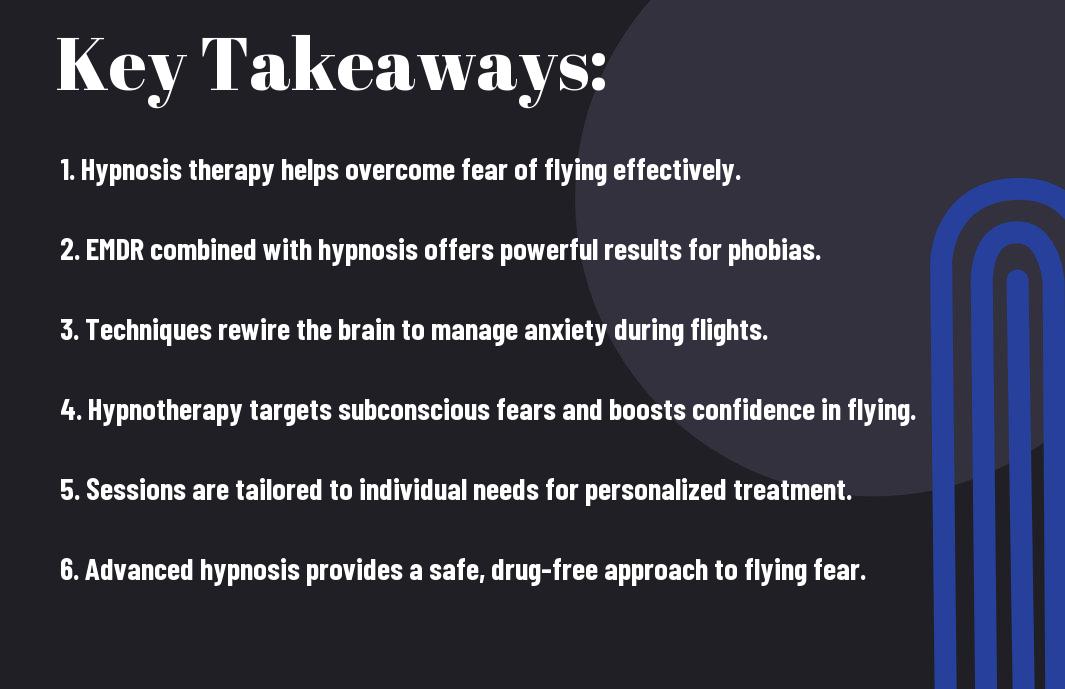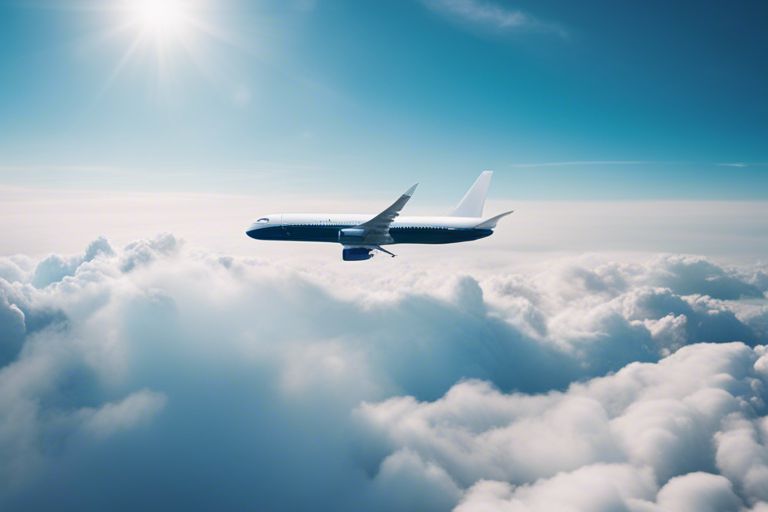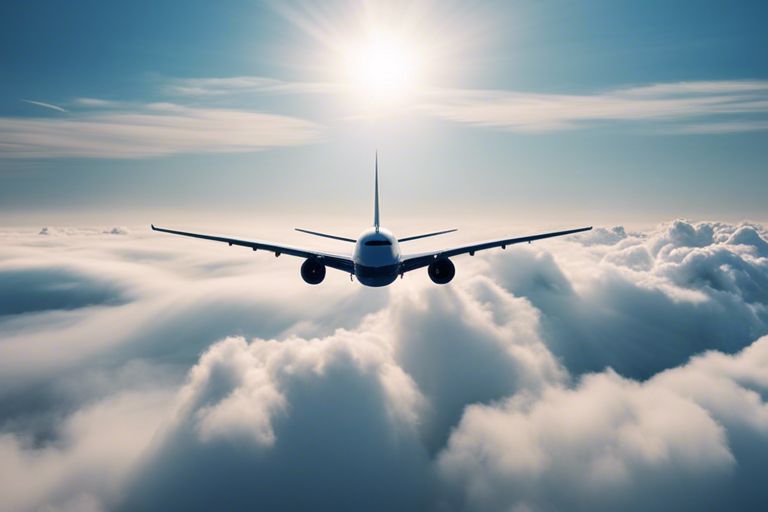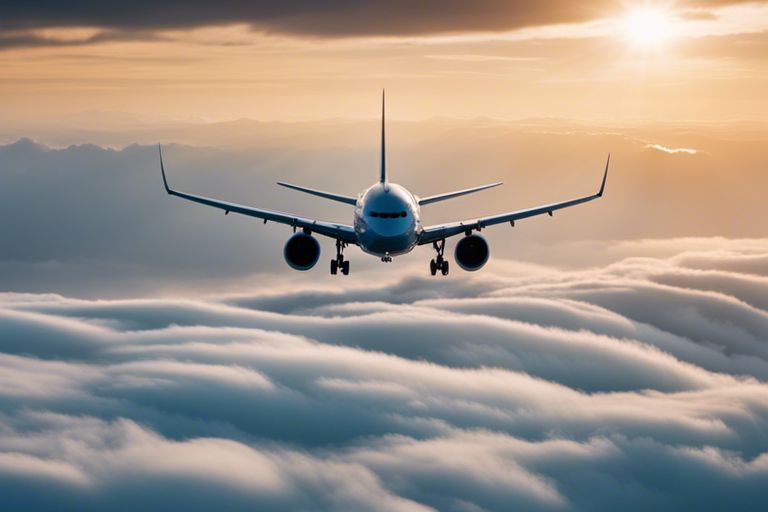Advanced Hypnosis Therapy for the Fear of Flying
Overcome your fear of flying with the transformative power of hypnosis therapy. This advanced technique helps individuals confront and conquer their anxiety around flying through deep relaxation and positive suggestions. Discover how hypnotherapy can rewire your mind to associate flying with calmness, safety, and confidence. Say goodbye to panic attacks and travel with ease and comfort using hypnosis therapy for the fear of flying.
Key Takeaways:
- Overcoming Fear of Flying: Hypnosis therapy can help individuals overcome their fear of flying by addressing the root cause of their anxiety and fear.
- Relaxation Techniques: Hypnosis therapy teaches individuals relaxation techniques to manage stress and anxiety related to flying, promoting a sense of calmness and control.
- Behavioral Changes: Through hypnosis therapy, individuals can make positive behavioural changes to reframe their thoughts and responses to flying, leading to a more positive flying experience.
- Customized Treatment: Hypnosis therapy for the fear of flying can be customized to address individual needs and concerns, providing personalized solutions for each client.
- Long-lasting Effects: Hypnosis therapy can have long-lasting effects on individuals, helping them build confidence, overcome fear, and enjoy flying without anxiety or stress.
Understanding Fear of Flying
The fear of flying, also known as aviophobia, is a common phobia affecting many individuals worldwide. This overwhelming fear can cause extreme anxiety and panic attacks when faced with the idea or reality of flying in an airplane.
Definition and Prevalence
On average, it is estimated that about 20-30% of the population experiences some level of fear of flying. This fear can range from mild discomfort to severe phobia, impacting a person’s ability to travel, explore new places, or visit loved ones. The fear of flying can stem from various sources, including past traumatic experiences, fear of heights, lack of control, or fear of crashing.
Causes and Triggers
Any combination of factors can contribute to the fear of flying. Past experiences, such as turbulence or a previous panic attack on a flight, can trigger intense fear in individuals. Additionally, fear of the unknown, fear of not being in control, or fear of enclosed spaces can all play a role in exacerbating this phobia.
Flying in an airplane can trigger both physical and emotional symptoms in individuals experiencing fear of flying. These symptoms can range from mild uneasiness to full-blown panic attacks, making it challenging for individuals to board a plane or enjoy a smooth flight.
Physical and Emotional Symptoms
To alleviate the fear of flying, individuals may experience physical symptoms such as sweating, trembling, rapid heartbeat, nausea, dizziness, or shortness of breath. Emotionally, fear of flying can manifest as intense anxiety, panic, fear of losing control, or fear of dying.
This can significantly impact a person’s quality of life and limit their ability to travel for work or leisure. Seeking help through hypnosis therapy can provide individuals with the tools to overcome their fear of flying and enjoy air travel once again.

How Hypnosis Works
Principles of Hypnotherapy
One of the fundamental principles of hypnotherapy is to access the subconscious mind through a heightened state of focus and relaxation. By bypassing the critical conscious mind, hypnosis allows the therapist to make positive suggestions directly to the subconscious, where deep-seated fears and beliefs reside.
The Role of Suggestion and Relaxation
One key aspect of hypnosis therapy is the use of suggestions to reframe negative thought patterns and behaviours related to the fear of flying. Through the power of suggestion, the therapist can guide the client towards a more calm and confident mindset when faced with flying, helping to replace fear with feelings of safety and relaxation.
Relaxation techniques are also crucial in hypnotherapy for the fear of flying. By inducing a state of deep relaxation, the therapist can help the client access their subconscious mind more easily, making it receptive to positive suggestions and imagery that can counteract fear-based responses.
Accessing the Subconscious Mind
One of the primary goals of hypnosis therapy is to access the subconscious mind, where past experiences and emotions are stored. By reaching this deeper level of the mind, the therapist can work to reprogram negative associations with flying and instill a sense of calm and control in the client.
Another important aspect of accessing the subconscious mind is the opportunity to uncover and address underlying issues that may be contributing to the fear of flying, such as past traumas or anxieties. By exploring these root causes, hypnotherapy can offer long-lasting relief and healing.

Benefits of Hypnosis for Fear of Flying
Reducing Anxiety and Panic
Panic attacks and overwhelming anxiety are common symptoms experienced by those with a fear of flying. Hypnosis therapy can be highly effective in reducing these debilitating feelings by addressing the root cause of the fear. Through deep relaxation techniques and guided imagery, individuals can learn to reframe their thoughts and responses to flying triggers, leading to a significant reduction in anxiety levels.
Building Confidence and Calm
Fear of flying often stems from a lack of confidence in the safety of air travel and the individual’s ability to cope with their anxiety. Hypnosis therapy helps in building confidence by instilling positive affirmations and suggestions during the hypnotic state. By accessing the subconscious mind, individuals can replace negative beliefs with empowering thoughts, fostering a sense of calm and control.
Building self-assurance and a belief in the ability to manage any anxious feelings that may arise during a flight is key to overcoming the fear of flying. Through hypnosis, individuals can enhance their self-esteem and trust in their capacity to stay composed and relaxed while flying.
Improving Sleep Quality
The fear of flying can often lead to sleep disturbances and insomnia in anticipation of an upcoming flight. Hypnosis therapy can help in improving sleep quality by teaching individuals relaxation techniques that promote deep, restful sleep. By addressing the underlying anxiety that disrupts sleep patterns, hypnosis can aid in achieving a more restorative and rejuvenating sleep experience.
Understanding the connection between fear of flying and sleep disturbances is imperative in addressing the overarching issue comprehensively. By improving sleep quality through hypnosis, individuals can enhance their overall well-being and mental resilience.
Enhancing Overall Well-being
Any fear or phobia can have a significant impact on a person’s overall well-being, affecting their daily life and mental health. Hypnosis therapy for fear of flying offers a holistic approach to addressing the fear at its core, leading to a profound improvement in mental, emotional, and physical well-being.
Flying can be a positive and liberating experience once the fear and anxiety associated with it are effectively managed through hypnosis therapy. By tapping into the power of the subconscious mind, individuals can transform their relationship with flying and cultivate a sense of peace and confidence in air travel.

Preparing for Hypnosis Therapy
Despite the fear of flying being a common phobia, addressing it through hypnosis therapy can be highly effective. Preparing for hypnosis therapy involves finding a qualified hypnotherapist, understanding the therapy process, and setting realistic expectations for the results.
Finding a Qualified Hypnotherapist
Any individual seeking hypnosis therapy for the fear of flying should ensure they choose a qualified hypnotherapist with experience in treating phobias. Look for certifications, reviews, and recommendations to verify the hypnotherapists’ credentials.
Understanding the Therapy Process
Preparing for hypnosis therapy involves gaining an understanding of the therapy process. This may include discussing the techniques used during sessions, the number of sessions required, and the expected outcomes. It’s vital to have a clear understanding of what to expect before beginning therapy.
Therapy. During the therapy process, the hypnotherapist will guide the individual into a relaxed state where their subconscious mind is more receptive to suggestions. This process aims to uncover underlying fears and beliefs related to flying and reprogram the mind to respond differently to triggers.
Setting Realistic Expectations
Another important aspect of preparing for hypnosis therapy is setting realistic expectations. While hypnosis can be highly effective in treating phobias, it may require multiple sessions to see significant results. It’s crucial to trust the process and be patient with the journey towards overcoming the fear of flying.
Hypnosis Techniques for Fear of Flying
Visualization and Imagery
To alleviate the fear of flying through hypnosis, visualization and imagery techniques can be highly effective. An individual is guided to imagine themselves in a relaxed state while visualizing a positive flying experience. This helps the subconscious mind create new associations with flying, replacing fear with calmness and confidence.
Deep Breathing and Relaxation
For individuals with a fear of flying, deep breathing and relaxation techniques can be beneficial in reducing anxiety and promoting a sense of calmness. An individual is taught how to control their breathing and induce a state of relaxation, which can help manage feelings of panic and fear associated with flying.
Understanding the importance of deep breathing and relaxation is crucial in managing anxiety and fear responses during a flight.
Positive Affirmations and Reframing
Positive affirmations and reframing techniques can assist individuals in changing negative thought patterns associated with flying. By replacing fearful thoughts with positive affirmations, individuals can reframe their mindset and approach flying with a sense of empowerment and ease.
With consistent practice, positive affirmations can rewire the brain to respond differently to flying triggers, ultimately reducing fear and anxiety.
Desensitization and Exposure
Fear of flying can be addressed through desensitization and exposure therapy in a hypnosis session. This involves gradually exposing the individual to flight-related stimuli while guiding them to manage their anxiety response. Over time, this can help individuals desensitize to their fear and build confidence in flying.
Overcoming Common Challenges
Managing Setbacks and Relapse
With hypnosis therapy for the fear of flying, it is crucial to acknowledge that setbacks and relapses can happen. This is a normal part of the healing process, and it’s important not to get discouraged if you experience it. During these times, it’s crucial to stay committed to your therapy sessions and continue practicing the techniques you have learned to manage your fear of flying.
Dealing with Turbulence and Flight Delays
Flight delays and turbulence can be triggers for anxiety in individuals with a fear of flying. Understanding that these are common occurrences and are not necessarily dangerous can help you navigate through these challenges. Practicing relaxation techniques, deep breathing exercises, and using visualization methods can help you stay calm during turbulent moments or unexpected delays.

Plus, it can be beneficial to communicate with the flight attendants or pilots about your fear of flying. They are trained to assist anxious passengers and may provide you with reassurance or guidance during the flight.
Coping with Claustrophobia and Confined Spaces
Relapse into feelings of claustrophobia or anxiety in confined spaces can happen, especially during a flight. Practicing mindfulness techniques and progressive muscle relaxation can help you manage these feelings. Additionally, engaging in positive self-talk and focusing on the safety measures in place can alleviate your anxiety.
Overcoming claustrophobia and fear of confined spaces is a gradual process that requires patience and persistence. Seeking support from a hypnotherapist who specializes in these areas can provide you with the tools and guidance to overcome these challenges.
To wrap up
Hence, hypnosis therapy for the fear of flying can be a highly effective solution for those seeking to overcome their phobia. By delving into the subconscious mind and utilizing techniques like EMDR, individuals can address the root cause of their fear and reprogram their thoughts and behaviours surrounding flying. This holistic approach can lead to long-lasting results and allow individuals to confidently and comfortably travel by air once again.
FAQ
Q: What is hypnosis therapy for the fear of flying?
A: Hypnosis therapy for the fear of flying is a form of treatment that uses relaxation techniques and guided visualization to help individuals overcome their fear or anxiety related to flying.
Q: How does hypnosis therapy help with the fear of flying?
A: Hypnosis therapy works by accessing the subconscious mind to reframe negative beliefs and associations about flying, replacing them with positive affirmations and calming suggestions.
Q: What are the benefits of hypnosis therapy for the fear of flying?
A: The benefits of hypnosis therapy include reducing anxiety, increasing confidence, improving relaxation, changing thought patterns, and ultimately helping individuals feel more comfortable and at ease with flying.
Q: What is EMDR and how is it used in conjunction with hypnosis therapy for the fear of flying?
A: Eye Movement Desensitization and Reprocessing (EMDR) is a psychotherapy approach that helps individuals process traumatic memories or phobias. When used in conjunction with hypnosis therapy for the fear of flying, EMDR can further help individuals overcome their fear by addressing underlying psychological issues.
Q: Is hypnosis therapy for the fear of flying effective?
A: Hypnosis therapy for the fear of flying has shown to be effective for many individuals, with research indicating significant reductions in anxiety levels and increased confidence when facing their fear of flying. It is a safe and non-invasive approach that can help individuals conquer their fears and enjoy the benefits of air travel.
The Official Instagram profile of Mind Spirit Body Hypnosis therapy.
About the author: Award-winning Fanis Makrigiannis of Mind Spirit Body Hypnosis therapy is a certified Hypnotherapist and Master Practitioner of Neuro-linguistic Programming with the American Board of Hypnotherapy. Proudly serving Durham Region, The Greater Toronto Area, Peel Region, Ontario, Canada, and the United States of America via Zoom meetings.




